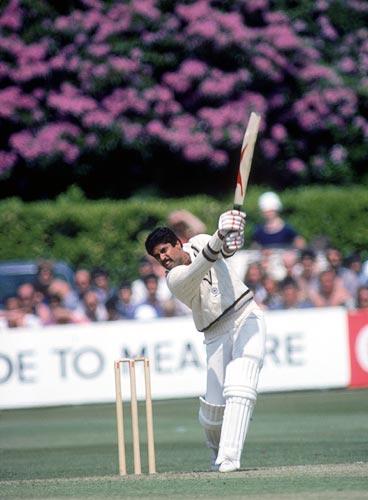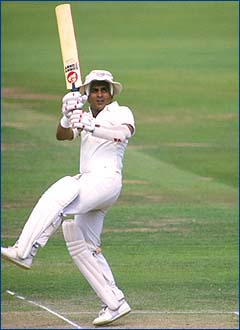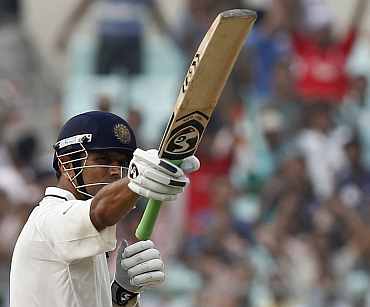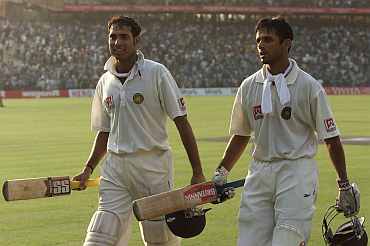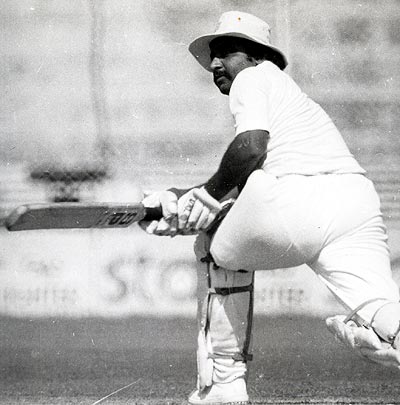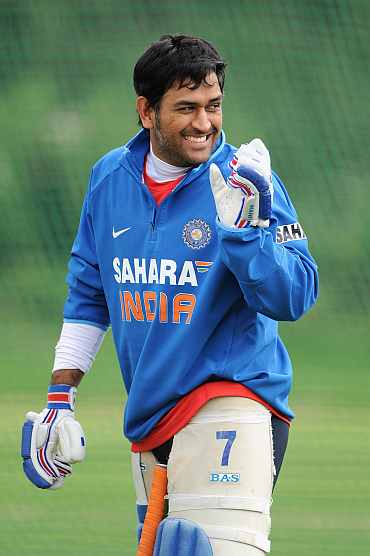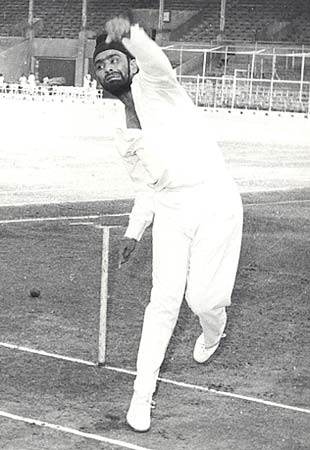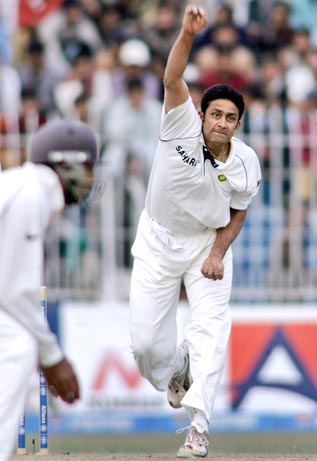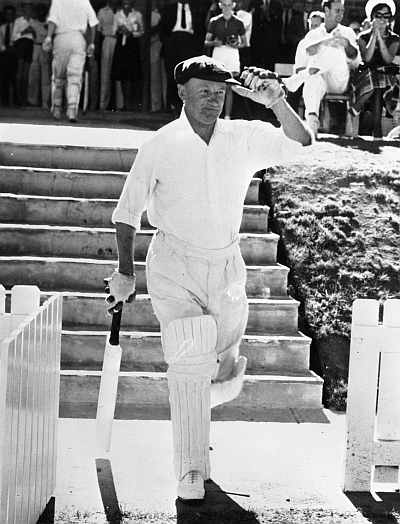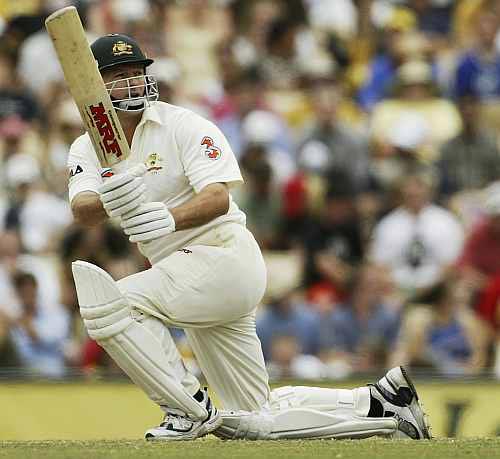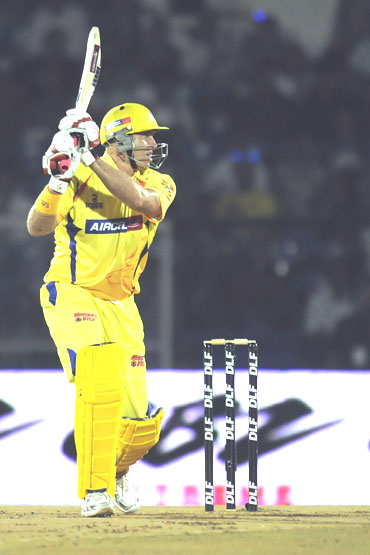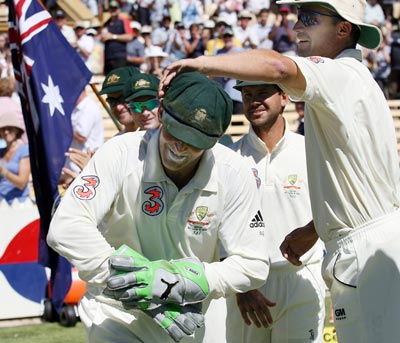 | « Back to article | Print this article |
Faisal Shariff's Dream Aussie, India XIs
Faisal Shariff, the well-known cricket journalist, picks his all-time India-Australia dream teams.
Check out Haresh Pandya's Dream India XI. Continuing our series on Dream Teams:
In most cases picking an all-time best eleven is an onerous task.
But in the case of India and Australia in Test matches, the task is easier.
The two modern-day rivals have been engaged in riveting contests since the turn of the 21st century. But before that the two sides were engaged in lopsided contests, with either doing well in home conditions or being half the force away from home.
In fact, exchanges between the two sides were so infrequent that the rivalry between them could never be established. So, the representative best elevens of both will bear a very modern look.
The likes of Sunil Gavaskar, G R Viswanath and Kapil Dev for India were the only names that come up from the era gone by on the basis of sheer performances against Australia, both home and away.
The rest of the Indian line-up is made up of cricketers who have added spice to the rivalry and played a part in raising its profile.
Please click Next to read further...
SMG and Viru will open
Sunil Manohar Gavaskar is the only top batsman in the combined list who has more hundreds than fifties and that statistic alone epitomises his dominance over the Aussies, never mind the blip when he let Dennis Lillee get under his skin and almost walked off the ground.
Virender Sehwag will walk out as Gavaskar's opening partner. Averaging 50 against Australia in Test cricket after two full tours Down Under is nothing if not the brilliant.
Please click Next to read further...
Next in: Rahul, Sachin and Laxman
Rahul Dravid, Sachin Tendulkar and V V S Laxman take their appointed places without a debate, though, for Dravid, his return of just two hundreds from 28 Tests pales in comparison to his otherwise remarkable batting report card.
It must be catalogued though that those two hundreds have almost defined India's success against Australia in Test cricket.
The first being the 180 he registered along with Very Very Special Laxman in the Eden Gardens Test of the famous 2001 series, and the second was the surreal win at Adelaide in 2003 when India beat Australia despite the hosts scoring 500 in the first innings.
Please click Next to read further...
Why is he Very Very Special?
The one statistic that defines Tendulkar's dominance of Australia is the fact that he remains the only batsman to score 3,000-plus runs in India-Australia series, starting from 1991, when he played against opener Geoff Marsh down to 2011, when he is playing against Geoff's son Shaun.
Laxman has some startling stats. He has never scored a hundred against Australia in India. He has only scored double-centuries -- that too twice.
His remaining four centuries have been in Australia.
What's really exciting is that he is second only to Tendulkar in the all-time run-getters's list in India-Australia Tests.
Please click Next to read further...
Why Vishy is at No 6
What an honour for all of us waking up at 5:00 every morning is that the current series features the top four run-getters in Tests between the two countries, all of whom have scored in excess of 2,000.
The most interesting number six batting position would go to Gundappa Viswanath, ahead of Dilip Vengsarkar, even though the Colonel has 1,300-plus runs against Australia as compared to 1,200-plus by Vishy.
The differentiator is the number of Tests these two classy batsmen took to get those runs.
Vishy got to 1,200-plus runs in just 14 Tests; Vengsarkar took 24 Tests to cross 1,300.
Vishy's hundred at the MCG in 1981 -- 12 years after that memorable maiden hundred against Bill Lawry's Aussies in Kanpur -- saw India script an unlikely win with a superb bowling performance from a young Kapil Dev.
Please click Next to read further...
MS, not Kiri
The other talking point would have been the wicketkeeper's slot.
A fantastic stumper like Syed Kirmani was magnificent in keeping to the spinners and Kapil as also with the bat.
Of the others 'keepers, only Mahendra Singh Dhoni has made a major impact on the team's fortunes. So he gets the vote over all the other notable worthies.
Please click Next to read further...
Bedi, not Bhajji
Much weightage has been given to records and performances of the chosen players against the rival sides in away conditions.
That's where a Bishen Singh Bedi scores over Harbhajan Singh, having done well in Australia and bagging three fifers in Brisbane and Perth and also getting four-fors in Melbourne and Adelaide.
The balance of the side dictated that E A S Prasanna narrowly misses out despite having won much acclaim on the 1967 tour.
Harbhajan, despite 90 wickets against the Aussies, finds himself out of the playing 11 simply because he struggled Down Under and bagged wickets by the buckets at home.
The same reason why -- surprise, surprise -- Shane Warne also misses out.
Please click Next to read further...
Guess who has taken 111 wickets against the Aussies?
Zaheer Khan completes the pace attack with Kapil Dev and there is little to dispute since Zaheer has taken at least four wickets in each of the three Tests he has played Down Under.
With 111 wickets from 20 Tests against the Aussies, Anil Kumble's inclusion doesn't require an explanation.
Please click Next to read further...
Some shockers stored for the Aussies
For Australia, the chosen team has some shockers -- no Sir Don, no Shane Warne, no Greg Chappell and no Dennis Lillee.
The Don played five Tests against India and scored at an astronomical average of 178.75, laced with four hundreds (two in the same Test).
However, since he did not play in India, Greg Chappell and he fail to make it to the playing eleven.
Warnie struggled in all his exchanges against India, thanks mainly to the Indian middle-order in the past decade which nullified his magic.
A Damien Fleming was steady, swung the ball and always successful against India either home or away.
The great Lillee played all but three Tests against India at home and that too towards the second phase of his illustrious career.
Please click Next to read further...
Waugh wins over Border
The issue of captaincy for both sides is a tricky one, but one that can be solved easily.
For India, the role rests with Kapil Dev, because of his performance as a leader there; for Australia, the fight was between two dogged characters -- Allan Border and Steve Waugh.
Waugh tips the scales in his favour despite failing to conquer the 'Final Frontier,' a series win in India.
Please click Next to read further...
Hayden, Lawry open...
Matthew Hayden and Bill Lawry walk out as openers for the Aussies.
Hayden was massive in his presence and performances. 'Phantom' Lawry, on the other hand, was as chirpy with the bat as he is behind the microphone.
Mark Taylor, Justin Langer, Michael Slater, even a Geoff Marsh, miss out because of Lawry's performances against India -- 892 runs; Average: 47; 12 Tests.
The middle-order is firmed up by the presence of the dogged David Boon, who averages 70 against India and tormented teams on the 1985-1986 and 1991-1992 tours.
The Aussie Batsman of the Decade -- Ricky Ponting -- provides a touch of class at number four; 'Punter' averages in the forties against India.
Allan Border and Steve Waugh complete the middle order.
Please click Next to read further...
Gilly, Benaud, McGrath...
Adam Gilchrist is the undisputed choice for the wicketkeeper's slot since Rodney Marsh did not play in India.
Gilly is followed by Richie Benaud who had more joy against India with his leg-spin than the bat.
The new ball pairing is in the able hands of Glenn McGrath and Craig McDermott, India's nemesis for the longest time ever. Damien Fleming completes the bowling attack.
My chosen elevens are bound to crank up the rivalry a notch higher than what it is right now.
INTERESTING TRIVIA: Adam Gilchrist, Rahul Dravid, Mark Waugh and Sachin Tendulkar have the unique batting distinction of four ducks each in India-Australia Tests -- the highest by any player.
The teams:
India:
Australia: Matthew Hayden, Bill Lawry, David Boon, Ricky Ponting, Allan Border, Steve Waugh, Adam Gilchrist, Richie Benaud, Glenn McGrath, Craig McDermott, Damien Fleming.
